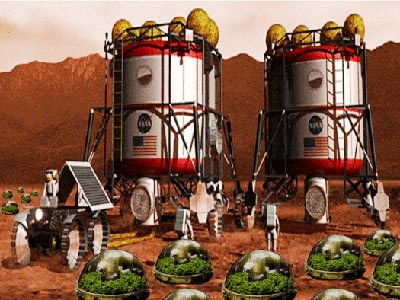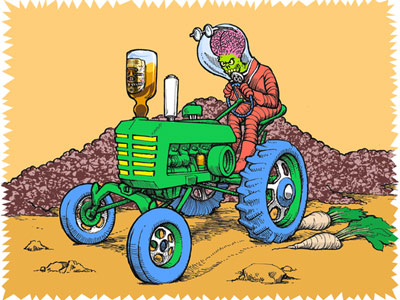Think about 'future' farms on Mars
Although people have not set foot on Mars, people are interested in farming solutions here. When the scope of human habitation can reach Mars, is the cultivation there as imagined now?
Once humans decide to reside in Mars, cultivation on this planet is quite simple. Thanks to the lower gravity in Mars we also use less water, less fertilizer than on Earth.

Imagine the Martian farming model.Photo: PopSci
Visualizing future space farms, people often think of hydroponic techniques but researchers Federico Maggia and Céline Pallud noted that traditional land use still has many advantages.
Cultivation on land can use settlers' waste as fertilizer, cultivation also helps capture carbon and generate oxygen and it is also a reliable method to filter biological water.
Gravity is a problem that Mars doesn't like Earth. On Earth, gravity affects the rate of water and nutrients flowing through the soil and plants must evolve to adapt to this condition.
Meanwhile, gravity in Mars is only 1/3 of the Earth, meaning that water will flow at a slower rate. However, Maggia and Pallud in the new study also said that this could cause plant roots and microorganisms to become watery, along with toxic gas emissions.

Funny photos - Agricultural machines run by biofuels made from whiskey
making the agricultural work in Mars more interesting. Photo: PopSci.
Research on this effect, University of Sydney biochemist Maggia and Pallud biochemist at Berkeley have used BIOTOUGHREAT, a model for transporting nutrients and microorganisms in the soil to regenerate the roots' activities Gravity of Mars and Earth. This model was developed by Lawrence Berkeley National Laboratory.
Scientists find transporting water slower is an advantage. The soil under the Martian gravity could hold more water so there is less water loss. This means we will only use 90% of irrigation water for Martian cultivation. We can also use less fertilizer.
However, the disadvantage is that the starburst soil makes oxygen consumption as well as decompose organic matter faster, which will increase the CO2 emissions by 10%.
So once we start settling down on Mars, agriculture can be more efficient but we still have to worry about greenhouse gas emissions.
- Project to build a water collection farm on Mars
- The future of humanity: Living on Mars and rural skyscrapers
- Risks face when living on Mars
- Future model on Mars in the future
- Announced 3 houses on the Moon and Mars
- The ice sheet on Mars can provide water for future residents
- Latest Mars map
- 5 reasons why people need to go to Mars
- Be overwhelmed by images of life on Mars that may appear in the future
- Discovering a 130-meter-thick ice shelf hidden under the surface of Mars
- Advertise on Mars
- Chance to Mars of Russia's NORD device
 The most famous scientific failures in history
The most famous scientific failures in history Mysterious genius mechanic and the machine froze time
Mysterious genius mechanic and the machine froze time The son carries the 'bad gene' of genius Albert Einstein
The son carries the 'bad gene' of genius Albert Einstein Isaac Newton
Isaac Newton Was there nuclear war in ancient times?
Was there nuclear war in ancient times?  What happens to dead bodies on Mars?
What happens to dead bodies on Mars?  Watch NASA probe 'capture' Martian sandstorm
Watch NASA probe 'capture' Martian sandstorm  First photo of Mars' strangely shaped moon
First photo of Mars' strangely shaped moon  What makes Mars different from Earth
What makes Mars different from Earth  How will humans build on Mars?
How will humans build on Mars? 